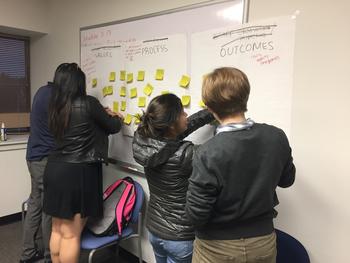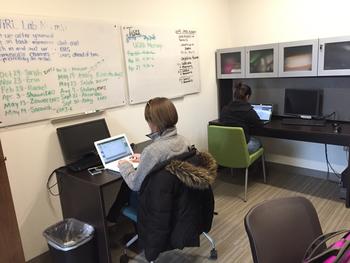In This Story
According to a new study by Social Work Associate Professor JoAnn Lee, the research, leadership, networking, and career skills students learned in SWiRL have benefited them professionally.

The College of Health and Human Services’ Social Work integrative Research Lab (SWiRL) was created to improve undergraduate students’ research skills, and a new alumni survey highlights how they learned professional and career skills beyond research in the collaborative lab.
SWiRL supports Bachelor of Social Work students in conducting research and allows Master of Social Work students to mentor undergraduate students. The lab also provides social work faculty and students with different interests to collaborate and learn from each other. Most other research labs are centered on a substantive topic, whereas SWiRL incorporates faculty with a range of different research topics and is connected by a shared focus on skill development among students.
“A majority of social work students are interested in clinical practice, not research, so we set up SWiRL to expose more students to the benefits of social work research. With data from the first four years of the program, it is great to see that alumni have used the skills they learned in SWiRL to support not only research, but other professional aspirations,” said Social Work Associate Professor and one of SWiRL’s founding faculty JoAnn Lee.
Alumni responses showed that participating in SWiRL increased the value they placed on research; taught them how to integrate research into practice; and provided leadership development, confidence building, and community. The alumni reported that they developed a range of non-research skills that help them in their current jobs, including creative problem solving, patience, accepting direction from others, taking responsibility for tasks, and written communication. Their experiences in SWiRL also contributed to their identity development, both as a social worker and as a researcher.

“Participation in SWiRL includes learning about the range of topics and methods that social work research covers as well as feeling like part of a community. The range of topics is an important aspect of students’ experiences because it contributes to their identity development as a social worker as they are exposed to the variety of possibilities within the social work field,” said Lee. Topics have included foster youth aging out of care, trauma and horticulture therapy, advance care planning for end-of-life, kinship care and program development, prevention and intervention of interpersonal violence, immigrant integration, and music and memory intervention for older adults.
Teaching Note—Student Satisfaction with an Integrative Research Learning Environment was published in The Journal of Social Work Education in February 2022. In addition to Lee, authors include graduate research supervisor Maya Mohindroo, assistant professor Eric Waithaka, undergraduate research assistant Ellen Carlson, graduate research supervisor Jonea Ahouissoussi, undergraduate research assistant Sara Alhassani, graduate research supervisor Kendall Barrett, graduate research supervisor Maxine Eber, undergraduate research assistant McKenzie Lauber, Department of Social Work Chair Emily S. Ihara, all from George Mason University.
The Department of Social Work began SWiRL in 2015 and faculty members have presented on the lab model at the Council of Social Work Education and published about it previously in 2017.
